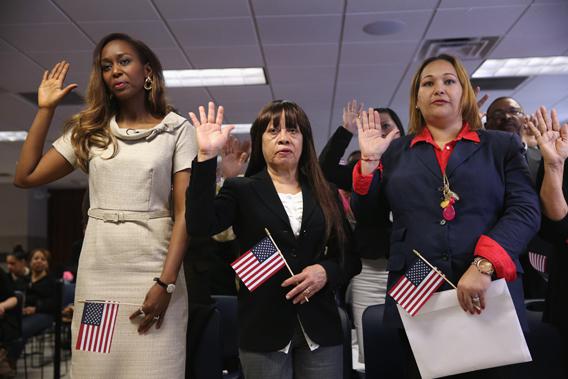The Senate’s big-ticket hearing on immigration reform had been planned, fought over, and mooted for weeks. It would decide whether Marco Rubio stayed at the table or marched away! It would grip Capitol Hill reporters, finally able to cover a bill that might pass without a last-minute crisis-driven kludge!
Or it would happen right as the nation turned its teary eyes to Boston and the area-wide manhunt for the 19-year-old immigrant suspected of setting up two devastating bombs along the route of the Boston Marathon. The hearing went forward—there’d been debate about whether it could—with a rump of special witnesses versed in economics-speak, but it made news only when the Senate’s best-known slayer of deer went after the elephant in the room.
“We appreciate the ability to talk about immigration, particularly in light of the events in Boston,” said Iowa Sen. Chuck Grassley. The Republican ranking member of the committee had just linked Dzhokhar Tsarnaev to the entire immigration infrastructure. Solving the crime in Boston, said Grassley, would “help shed light on the weaknesses in our system.”
Democrats and Republicans shoved back, immediately. “I’d like to ask that all of us not jump to conclusions regarding the events in Boston,” said New York Sen. Chuck Schumer, one of eight senators who midwifed the immigration deal. “In general, we’re a safer country when law enforcement knows who is here, has their fingerprints, photos, etc; has conducted background checks; in general, no longer needs to look for needles in haystacks.”
National tragedies have a funny way of convincing politicians that they were right all along. The Boston bombings were shaping the immigration debate days before any hard information emerged about a suspect. When a few outlets falsely suggested that a “Saudi national” had been nabbed, Iowa Rep. Steve King saw new reason to “take a look at the visa-waiver program.” Arizona Sen. John McCain wondered whether the crisis “may be an argument for the kind of things we’re talking about.”
But the suspect isn’t a foreign national. There are two suspects, neither of whom needed a fresh visa to stay in the United States. They arrived here 11 and nine years ago. Tamerlan Tsarnaev carried a green card; Dzhokhar Tsarnaev was naturalized on Sept. 11, 2012. They joined a relative in the United States after living in, then fleeing, former Soviet republics along the Caucuses. In a TV interview, their uncle Ruslan Tsnari said that the brothers “got their start as refugees, refugees from war.”
How would the immigration bill, as written, have affected them? It might not have changed anything. It would allow any child or parent of a spouse of a U.S. citizen to come ashore and earn citizenship. After an 18-month period it’ll crack down on siblings of American citizens. Current law, according to Sen. Schumer, has already been tweaked the right way: “Both the refugee program and the asylum program have been strengthened in the last five years such that we are much more careful about screening people and determining who should and should not be in the country.”
Terrific! And irrelevant in Boston. In the first, furtive speculation about the suspects, politicians were expecting to talk about student visas, for people just arrived in the country. Muhammad Atta got a tourist visa to the United States just 18 months before he hijacked American Airlines Flight 11. But the Tsarnaevs, as the president of Chechnya was so ready to remind us, belonged to the United States.
Immigration reformers are going to bring up Boston anyway. In an interview with C-Span, Illinois Rep. Luis Gutierrez argued that a robust legalization and background check program would free up money for counterterrorism. “If you legalize 11 million people now, there’s a whole bunch of people you can take right off the table,” he said. “Now there’s a smaller community of people that you can use that $18 billion to go after.”
Sounds great, unless you’re a member of some “smaller community.” New York Rep. Peter King used the facts about Boston to make the case—as he does, all the time—for more monitoring of Muslims in the United States. “I think we need more police and more surveillance in the communities where the threat is coming from,” he told National Review, “whether it’s the … Italian community with the mafia or the Muslim community with the Islamic terrorists.”
That’s not really part of immigration policy, though. It’s not obvious that any of that would have collared someone like Dzhokhar Tsarnaev, who’s been remembered all day on social media as a Jay-Z quoting pothead. Maybe we’re headed for a discussion about radicalization of Muslims in America, the kind that the United Kingdom has had for years, the kind that King wants. But on immigration, the most doable reforms are going to affect people whose stories sound nothing like the Tsarnaevs.
Late on Friday, I talked to Haider Javed Warraich, a resident at the hospital that declared Tsarnaev’s brother dead. Two days earlier, he’d published a New York Times column about his fear that the suspect would look like him, or at least bow to Mecca. He’d been half right.
“My wife and I were hoping to have a baby this year,” said Warraich. “I don’t know what the effect will be. If our parents wanted to visit us, could they? In the past, when something like this has happened, visa issuances, visa policy, become much more strict. That’s very true when you’re coming from Pakistan.”
